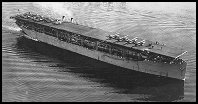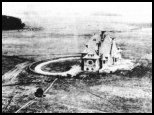 USS Langley in 1928 - Sunk 1942 |
Project 60: A Day-by-Day Diary of WWII
Remembering the First Fight Against Fascism |
 German Bruneval radar station |
 USS Langley in 1928 - Sunk 1942 |
Project 60: A Day-by-Day Diary of WWII
Remembering the First Fight Against Fascism |
 German Bruneval radar station |
February 24, 1942 Soviet attacks near
Lake Illmen succeed in surrounding the German II Corp at Starryy Russa. February 25, 1942 Japanese attacks in Burma break the British lines at Pegu, threatening to cut the Rangoon-Mandalay railroad. British bombers hit
the Gneisenau while she was undergoing repairs in the Kiel drydock. The
damage was extensive and she would not put to sea again during the war. February 27, 1942 The first major
surface action of the Pacific war , the Battle of the Java Sea, opened. Dutch
Admiral Karel Doorman, leading a rag tag band of Allied warships attempted to
intercept the Japanese invasion fleet heading for Java.
At 1620, contact was made between the two fleets. The Japanese fleet,
scored first, hitting the British cruiser Exeter with an 8-inch
shell. She lost most of her power, and was knocked out of the battle. The next
catastrophe for the Allies came when the Dutch destroyer Kortenaer was
hit midship by a torpedo, broke in half and sank. Soon afterward, the British
destroyer Electra was sunk by three Japanese destroyers. Allied fire
managed to damage the Japanese Asagumo forcing her out of the battle. As
dusk approached, Doorman withdrew to regroup his scattered fleet and attempt to
swing around the Japanese screen to hit the enemy transports. At 2125, the
British destroyer Jupiter struck a mine and blew up. At 2300, the
Japanese spotted Doorman's cruisers and succeeded in sinking Java and
De Ruyter. The Perth and Houston withdrew to Batavia. The
Japanese had won handily. British paratroops
made a daring raid into France. The Germans had erected a radar station at
Bruneval, near Le Havre and the British wanted to get a hold of the new German
equipment. The raid was more than successful. Only two British paratroops were
killed. The radar sets were captured intact and as a bonus, one of the German
operators was captured and brought back to England. February 28, 1942 Elements of the
Japanese 16th Army land on the north coast of
Java. The main body of the invasion force heads for Batavia, capital of
the Dutch East Indies. Upon making repairs,
the British cruiser Exeter, escorted by the destroyers Encounter and
Pope, leave Surabaya. At 0930, they were spotted by the Japanese and
sunk. March 1 29, 1942 A US Hudson of squadron VP-82, based at Argentia in Canada, sinks U-656 off Cape Race, Newfoundland. March 2, 1942 Japanese forces land
at Mindanao in the Philippines. The US Government opened its racist attack on the Japanese by barring all persons of Japanese ancestry, including US citizens, from Pacific coastal areas. A similar ruling for those of German or Italian ancestry in Atlantic coastal areas, of course, never materialized. 1941 Archive: 1942 Archive: Special Editions: Editor's Corner Archive: Afghanistan and Vietnam: When the "war against terrorism" began, many knowledgeable people warned that our operations in Afghanistan would turn into another Vietnam. Want to Win - Think Before You Lash Out - "If we are serious about taking the war to the enemy, it is time to look ..." The First Fight Against Fascism - We must remember the Spanish Civil War also. Arguing Victory - "... Each nation who fought against fascist tyranny in WWII brought with it part of whole needed to defeat that evil..." War, Glory, Honor and Remembrance - "War is a brutal and savage insult on human society..." The
First Casualty... in time of war, those in power are even more inclined to hide the truth,
since that truth is often manifest in the most gruesome and terrible
acts. Those wishing to contribute items. stories or comments should contact D.A. Friedrichs |
Editor's Corner The items found in this section are comments from the editors of Project 60 and may not necessarily reflect the opinions of bartcop. The Afghan War and the Geneva Convention This
is part two of a four-part essay
on the application of the Geneva Convention toward the Afghan War. The
importance of this issue is that the Bush administration, by its
complete misreading of international law has left the United States
vulnerable to charges of war crimes. Our nation is better than that and
those who supposedly lead us, should not act in criminal manners. Bush,
Ashcroft and Rumsfeld have managed, in their ridiculous declaration
regarding POWs in this war, to lay waste to any pretext we have to be
the guardians of human rights in the world today. Part
one discussed the status of those taken by our forces during the
conflict. Part two looks at the Geneva Convention in more detail and
clarifies the rights POWs have. Part three will examine, in detail,
cases of war crimes committed by our soldiers in the field. Part
2: What Rights? The
Bush administration has made a great deal of noise in attempting to show
that the conditions at Camp X-Ray and the treatment of the prisoners is
far better than anything they had at home and that they are being
treated under conditions outlined in the Geneva Convention. The first
contention is, quite frankly, immaterial and the second is a plain
old-fashioned lie. Article
25 states Prisoners
of war shall be quartered under conditions as favourable as those for
the forces of the Detaining Power who are billeted in the same area. The
said conditions shall make allowance for the habits and customs of the
prisoners and shall in no case be prejudicial to their health. The
foregoing provisions shall apply in particular to the dormitories of
prisoners of war as regards both total surface and minimum cubic space,
and the general installations, bedding and blankets. The premises provided for the use of prisoners of war individually or collectively, shall be entirely protected from dampness and adequately heated and lighted, in particular between dusk and lights out. This
means that the state that the soldiers were suffering under before their
capture is not the important factor. The condition that our soldiers
are housed under is the guiding factor for the prisoner's conditions.
The United States is not adhering to the spirit, let alone the letter of
this article. By caging prisoners in open-air pens, we make ourselves
very vulnerable to reasonable criticism and potential charges of war
crimes. Article
13 states Prisoners
of war must at all times be humanely treated. Any unlawful act will
be regarded as a serious breach of the present Convention. In
particular, no prisoner of war may be subjected to physical mutilation
or to medical or scientific experiments of any kind which are not
justified by the medical, dental or hospital treatment of the prisoner
concerned and carried out in his interest. Likewise,
prisoners of war must at all times be protected, particularly against
acts of violence or intimidation and against insults and public
curiosity. Measures
of reprisal against prisoners of war are prohibited. Article
14 states Prisoners
of war are entitled in all circumstances to respect for their persons
and their honour. Women shall be treated with all the regard due to
their sex and shall in all cases benefit by treatment as favourable as
that granted to men. Prisoners of war shall retain the full civil
capacity which they enjoyed at the time of their capture. The Detaining
Power may not restrict the exercise, either within or without its own
territory, of the rights such capacity confers except in so far as the
captivity requires. Housing
the Camp X-Ray prisoners in open-air cages, shackled, and under intense
floodlights day and night would not be considered appropriate under this
article of the convention. Article
17 states
This
is reiterated in clearer and stronger language in Article 87, which
states
Calls
from an enraged American public to torture of these men must be stamped
out with gusto. These men cannot be mistreated. Not only the convention,
but our own 5th Amendment prohibits the types of abuse which
many in this country seem to think is just and right. Even if torture is
not the case, our actions to date are not without serious question. We
are very vulnerable, if not guilty out of hand for violating the
convention on this point. Article
20 regards the transport of prisoners of war and states
This
means that we cannot hood the prisoners, we cannot drug the prisoners,
we cannot beat the prisoners. This, allegedly, was not the case when
POWs were moved from Afghanistan to Camp X-Ray. Article
70 states
To
date, the United States government has categorically refused to release
any information regarding the prisoners, let alone allow them to
communicate with anyone outside the prison. This is a major violation of
the convention and leaves our national leaders open to war crimes
charges. Other
articles that we are ignoring include the following: Articles
18 and 40 state that the POWs are to retain their personal belongings,
badges of rank, and clothing. The Camp X-Ray prisoners have been
stripped of every vestige of the personal belongings. Article
22 refers to the housing conditions of prisoners. Open-air cages are not
included in the acceptable realm of housing. Articles
26 and 29 allow the POWs to care for and feed themselves. This is not
the case at Camp X-Ray. Article
38 allows and encourages the opportunity for POWs to exercise and
participate in games. This is not the case at Camp X-Ray. Articles
71 through 77 provide provisions for prisoners to send and receive mail
and parcels. All of these provisions are being ignored by the United
States. Article
118 outlines procedures for repatriation after the end of hostilities.
Since a new government has been installed in Afghanistan, these
provisions are in force. Of course, they are being ignored by the United
States. |